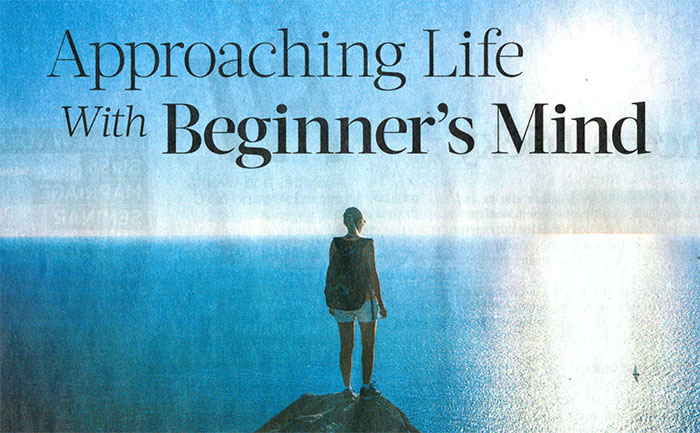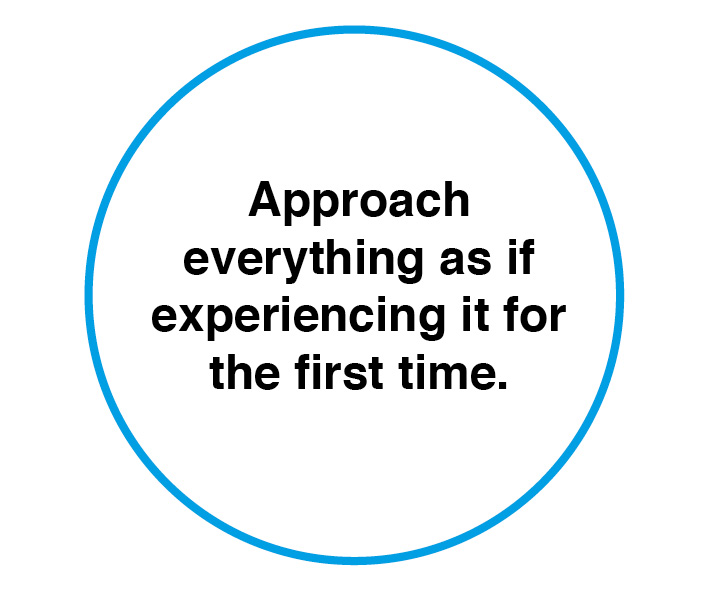
fit
SKVALVAL (HIKER); TAKAYUKI/SHUTTERSTOCK (MEDITATION)

By Leo Babauta
A lot of our troubles could be solved by one simple practice.
A lot of joy could be found with the same practice.
And it is simple: practicing seeing life with a beginner’s mind.
I’m stealing this of course from Shunryu Suzuki’s “Zen Mind, Beginner’s Mind,” and I’ve written about it numerous times. But it’s more fundamental than most people realize.
It’s not just something you practice when you’re learning something—though dropping the “expert’s mind” and seeing the learning as a beginner is an important practice in learning. It’s something you can practice every single moment of the day (if you can remember to do so).
What is beginner’s mind? It’s dropping our expectations and preconceived ideas about something, and seeing things with an open mind and fresh eyes, just like a beginner. If you’ve ever learned something new, you can remember what that’s like: You’re probably confused, because you don’t know how to do whatever you’re learning, but you’re also looking at everything as if it’s brand new, perhaps with curiosity and wonder. That’s beginner’s mind.
But imagine if you could apply this to every activity. Take eating breakfast, for example:
As you can see, this practice of beginner’s mind transforms the activity. Why It Matters Practicing beginner’s mind with an activity brings many benefits.
• Better experiences: You aren’t clouded by prejudgments, preconceptions, or fantasies about what it should be or assumptions about 111111111111111m.
The practice of beginner’s mind allows us to be more flexible, open, curious, grateful, and present.

Meditating every day is a good way to practice being in the moment.
•Ir ceived ideas about the outcome, and instead embrace not knowing. Embrace being present and finding gratitude in the moment for what you're doing and who you're meeting.
As you can see, the practice of beginner’s mind can transform any activity, get rid of many of our difficulties, and allow us to be more flexible, open, curious, grateful, and present.
I’m not saying all of this happens automatically. It takes practice, but it’s worth it.
Beginner’s mind is what we practice in meditation. Instead of sitting in meditation and thinking you know what your breath will be like, or what the present moment in front of you will be like, you pay attention. See it with fresh eyes. Drop your preconceived ideas and just look clearly at what’s in front of you.
A daily meditation practice is extremely useful in developing this way of seeing. Here’s how to practice:
1
Sit comfortably and upright in quiet place.
2
Pay attention to your body, then your breath, trying to see them clearly and with a fresh perspective.
3
When you notice yourself having preconceived ideas, wandering from the present moment and thinking you know how it will be ... just notice it.
4
See if you can drop the ideas and thoughts and fantasies and stories that are filling up your head. Empty yourself so you can see what’s actually in front of you. See what your breath is actually like, right now, instead of what you think it will be or what you’re thinking about.
Repeat the last few steps, over and over. See the thoughts and fantasies, empty yourself, and see what’s actually there.
You can practice this right now, with whatever is in front of you—with how your body feels, how your breath feels, and whatever else is around you.
You can practice whenever you do any activity, from brushing your teeth, to washing the dishes, to %v. walking and driving, to using your